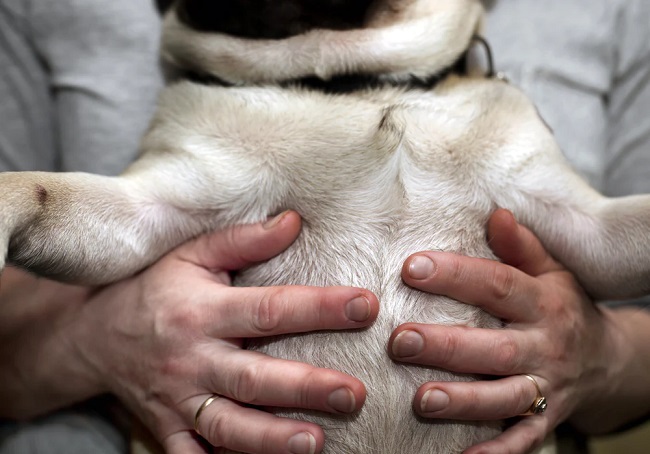As a dog owner, you know your furry friend inside and out, from their playful antics to their favorite treats. However, discovering your dog’s stomach is hard can be alarming. Understanding why this occurs and knowing the proper steps for treatment is crucial.
This article will guide you through the possible causes of a hard stomach in dogs, how to diagnose the issue, and the best methods for treatment.

Why Is My Dog’s Stomach Hard?
There are various reasons why your dog’s stomach may feel harder than usual, ranging from minor issues to more serious conditions.
Read Also:
Potential Causes of a Hard Stomach in Dogs
Understanding potential causes can help you gauge the severity of the situation and decide on your next steps.
Overeating or Gas
Sometimes, the issue can be as simple as overeating or gas, both of which can cause your dog’s stomach to expand and feel hard. This may resolve on its own, but if your dog appears to be in discomfort, it’s worth consulting with a vet.
Gastric Dilatation-Volvulus (GDV)
GDV, also known as bloat, is a potentially life-threatening condition common in large breed dogs. It occurs when the stomach twists, trapping gas and food inside. Bloat is a medical emergency that requires immediate veterinary attention.
Other Medical Conditions
Other possible medical causes include constipation, obesity, tumors, or infections. If your dog’s hard stomach is accompanied by other worrying signs like vomiting, lethargy, loss of appetite, or changes in behavior, it’s crucial to seek veterinary assistance promptly.
Diagnosing a Hard Stomach in Dogs
If your dog’s hard stomach persists or is accompanied by other worrying symptoms, it’s time to consult a vet.
Veterinary Examination
Your vet will conduct a thorough physical examination, considering your dog’s history and current symptoms. They may use imaging techniques like radiographs or ultrasounds to get a better view of your dog’s abdomen.
Further Tests
In some cases, further tests like blood work, urine analysis, or biopsies may be required to identify the root cause of the issue.
Treatment for a Hard Stomach in Dogs
Treatment will depend on the cause of your dog’s hard stomach.
Home Care
For less serious conditions like overeating or gas, your vet might suggest monitoring your dog at home and implementing dietary changes.
Medical Intervention
Serious conditions like GDV, tumors, or severe infections usually require immediate medical intervention. This might include surgery, medications, or other specialized treatments.
Prevention and Post-Care
You can take steps to prevent some causes of a hard stomach in dogs.
Dietary Habits
Feeding your dog smaller, more frequent meals can help prevent overeating and gas. Ensure your dog’s diet is balanced and appropriate for their breed, age, and health status.
Regular Exercise
Regular, moderate exercise can help maintain healthy digestion and prevent constipation and obesity.
Regular Check-Ups
Routine veterinary check-ups can help catch any potential issues early.
Read Also:
Conclusion
A hard stomach in dogs can be a cause for concern, but understanding the potential causes and appropriate actions can equip you to handle the situation effectively. While some cases may resolve with simple home care and dietary changes, others require immediate veterinary intervention.
Regular vet visits, proper diet, and moderate exercise can play a significant role in preventing such health issues. Always remember, when in doubt, consult with a veterinary professional.
























